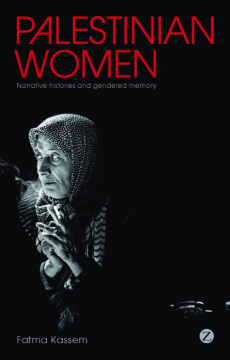
Additional Information
Book Details
Abstract
Palestinian Women is the first book to examine and document the experiences and the historical narrative of ordinary Palestinian women who witnessed the events of 1948 and became involuntary citizens of the State of Israel.
Told in their own words, the women's experiences serve as a window for examining the complex intersections of gender, nationalism and citizenship in a situation of ongoing violent political conflict.
Known in Palestinian discourse as the 'Nakbeh', or the 'Catastrophe', these events of 60 years ago still have a powerful resonance in contemporary Palestinian-Jewish relations in the State of Israel and in the act of narrating these stories, the author argues that the realm of memory is a site of commemoration and resistance.
'A powerful and much-needed oral history of the Nakba from the "forgotten community" of Palestinian women who live on in Israel.'
Jonathan Cook, author of 'Disappearing Palestine' (Zed, 2008)
'This is the first book to systematically analyse the life stories of Palestinian women in Israel, highlighting the important formative effect of the events of 1948. This book should be read by students and scholars of Palestine and Israel as well as all those who seek alternative solutions for peace with justice.'
Nicola Pratt, editor of 'Women and War in the Middle East'
'Fatma Kassem's book brings critical attention to the difficult position of Palestinian citizens of Israel. Her extremely moving, interesting and well written book adds to existing historical accounts of the Nakba by documenting the gendered memory and narrative history of a previously silenced population, namely Palestinian women living inside Israel. However, her own family history and her personal experiences within Israeli academia are also crucial to this important book as they tell us a lot about the politics of knowledge production and the micro-politics of the Israeli state.'
Nadje Al-Ali, Professor of Gender Studies, Chair, Centre For Gender Studies, SOAS
Fatma Kassem is as a Board member of the association for promoting higher education among Bedouin women in the Negev.
Table of Contents
| Section Title | Page | Action | Price |
|---|---|---|---|
| About the author | ii | ||
| Acknowledgements | vi | ||
| Introduction | 1 | ||
| History and memory | 3 | ||
| Memory as threat | 7 | ||
| Voices from the margins | 9 | ||
| Note on terminology | 11 | ||
| Overview of the book | 16 | ||
| One | My Family Stories | 19 | ||
| The story of Sabalan | 27 | ||
| Nationalism is not enough | 33 | ||
| The Zionist occupation and destruction of Sabalan | 35 | ||
| Conclusion | 39 | ||
| Two | Life Story: Methodological Aspects | 41 | ||
| Lyd and Ramleh: Palestinian cities | 42 | ||
| Women in the cities and marginalization | 44 | ||
| Text and context | 45 | ||
| A story of her own | 52 | ||
| Creating the text | 54 | ||
| Conclusion | 62 | ||
| Three | The Researcher’s Story | 64 | ||
| The approval process | 65 | ||
| Conclusion | 79 | ||
| Four | Language | 82 | ||
| Before entering Lyd and Ramleh | 84 | ||
| On the gates to the cities | 84 | ||
| Bashful beginnings | 86 | ||
| I’m originally from here | 87 | ||
| I’m originally not from here | 89 | ||
| The Jews entered and took us | 91 | ||
| Healing wounds | 96 | ||
| We migrated | 102 | ||
| Speaking about the ‘infiltrator’ | 105 | ||
| Again we all are from here | 108 | ||
| Expressing agency: verbs | 112 | ||
| The days of the English | 116 | ||
| Revolution | 119 | ||
| The days of the Arabs versus the days of Israel | 120 | ||
| We liberated our land and built our home | 125 | ||
| Conclusion | 127 | ||
| Five | The Body | 129 | ||
| The body remembered | 131 | ||
| Images of the male body | 137 | ||
| Images of the female body | 152 | ||
| The body: agent of resistance | 172 | ||
| Conclusion | 186 | ||
| Six | Home | 189 | ||
| Home contextualized and historicized | 191 | ||
| The days of the Arab | 201 | ||
| 1948 | 204 | ||
| After 1948 : ongoing struggles for entitlement | 217 | ||
| The home here and now: struggling for legitimacy | 227 | ||
| Conclusion | 235 | ||
| Conclusion | 237 | ||
| Notes | 241 | ||
| Introduction\r | 241 | ||
| Chapter one\r | 242 | ||
| Chapter two\r | 243 | ||
| Chapter three | 244 | ||
| Chapter four\r | 245 | ||
| Chapter five | 246 | ||
| Chapter six | 247 | ||
| References | 250 | ||
| Index | 257 |
